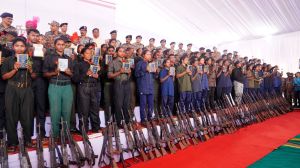Diplomatique Dogfight
Faced with allegations from Airbus, tinged with diplomatic overtones, raising doubts over Air-India’s decision to purchase 50 Boeing ai...

Faced with allegations from Airbus, tinged with diplomatic overtones, raising doubts over Air-India’s decision to purchase 50 Boeing aircraft for $6 billion, the Maharaja has approached the Solicitor General to look at ways to counter the accusations.
Indications are A-I will write to Airbus, objecting to the remarks made by its senior executive within days of its decision to opt for Boeing. While A-I is unlikely to file a case against the French aircraft manufacturer, it is keen to take up the matter strongly and has sought legal opinion to ensure that it does not violate any norm as the purchase is yet to get government clearance.
Though US President George W. Bush downwards to US Transport Secretary Norman Y. Mineta did urge India to buy more Boeing aircraft, A-I insists that no diplomatic consideration influenced its decision to side with US aircraft manufacturer Boeing. Of course, French leaders too have pitched for Airbus at the highest level.
Here are Airbus’ charges and AI’s counter:
• Charge: Air India issued its request for proposal (RFP) two days before Airbus could launch A-350 that could have competed with Boeing 7E7-8.
Counter: There was no prior intimation of the launch and the RFP had been finalised earlier, only board approval was awaited. Specifications could not have been changed to accommodate one aircraft type.
• Charge: A-I made last-minute changes to its seat and aisle width specifications to accommodate a 9-seat configuration being offered by Boeing in the 7E7-8s. No major airline operates what is called a 9 abreast configuration to cater to passenger comfort.
Counter: The specifications were not altered from what was issued in the RFP and that it is the airline’s prerogative to choose the seat configuration. More seats means better economic performance.
• Charge: Delivery schedule of Boeing 7E7-8s cannot begin earlier than 2008-09 while AI had mentioned a quicker delivery timeframe, around 2007, in the RFP.
Counter: Even Airbus had said it would need more time to deliver its aircraft. Especially, in the case of Airbus 340-500 that was competing with Boeing 777-200 (Long Range). Meeting the deadline was a problem with both parties and given the processes still involved in finalising the deal, AI felt it could be flexible on delivery to get the aircraft it wants.
• Charge: Airbus wrote several letters expressing its concerns but received no response from the airline.
Counter: It is inappropriate to exchange communiques when the evaluation is underway. Even IA never responded to Boeing when it brought down its offer by Rs 700 crore after the IA board had opted for 43 Airbus aircraft.
While this deal will be evaluated by the government later, the onslaught by Airbus has surprised India. Sources pointed out that Airbus has benefited from the rapid growth in the country’s aviation sector and, in fact, cornered most of the recent orders until the A-I decision.
Indian Airlines (43 aircraft), Kingfisher (33 aircraft) and Air Deccan (30 aircraft) — together their orders would add up to over $6 billion — have all opted for Airbus. It also had good news from Boeing user Jet, which opted for the A340-300 to operate on some of its international routes.
With international routes being opened up for private carriers like Jet and Sahara and the emergence of new ones, the opportunities for both Boeing and Airbus will be immense. It is estimated that by 2010, aircraft orders worth $15 billion will be placed by Indian carriers.
So, official sources ask, is there any reason for Airbus to rake up issues on a deal in the works. Of course, airlines have autonomy to choose the aircraft that suits their plans best.
Photos






- 01
- 02
- 03
- 04
- 05

























